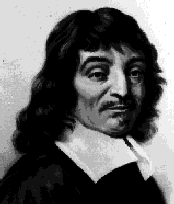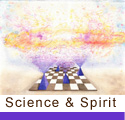
Mind and Body:
From René Descartes to William James
|
Story Supplement
The Reverend Dr. Lindon Eaves is Priest-In-Residence at St. Thomas' Episcopal church in Richmond, Virginia, and Professor of Human Genetics and Psychiatry at Virginia Commonwealth University. The following is excerpted, with his permission, from an Advent sermon in 2004. Speaking in the context of a consideration of the ongoing controversy about the teaching of evolution, Dr Eaves suggests, from a quite different perspective, a story about "truth" not unlike that offered in Writing Descartes. Dr Eaves' sermon also suggests one route by which science and religion might make richer common cause (see Science and Spirit on Serendip).
A transcript of Dr. Eaves full sermon is available on line ("Advent III (2004)"). A version of it also appeared as an editorial commentary in the Philadelphia Inquirer on Sunday, January 2, 2005. |
The Life of Faith is Not a Life Without Doubt
Reverend Dr. Lindon Eaves
Not long ago, the Board of Education in Cobb County, Georgia
decided to fix a problem with the biology textbook. They had
little stickers printed to go inside the front cover of every biology
textbook in the county. It said something like "Evolution is only a
theory". The Board insisted on equal classroom time for evolution and
creationism.
Last week, I suggested ... that we should have little stickers printed to go
inside all our prayer books in the pews with the words "God is only a theory"
and give equal pulpit time to Jesus and Darwin.
This story from the cultural backwoods reminds me that what is at stake today
is not simply about politics or even religion. These are just a symptom. The
real issue is "truth". What is "truth" and how do we know it? The real
difference between Eaves and the Board of Education is not that I believe
evolution is a fact - that is bad science. The real problem is that I believe God
is only a theory. By saying so, I believe I am being more faithful to my
humanity in a very big universe than the board of education. Furthermore, I
believe I am being more faithful to the truth about Jesus.
It is all about truth. It's about what we think we can be sure about and about
how we think we know it. Is there eternal truth, and do we already know it
with unquestionable certainty? Or is the idea of eternal truth a myth concocted
because we can't live in a mysterious and uncertain world?
Before Jesus was born, the poet Xenophanes wrote:
"The gods did not reveal at the beginning all things to us, but in the course of
time, through seeking, we may learn and know things better. As of certain
truth, no one has known it - not of the gods, nor yet of all the things whereof I
speak. For all is but a woven web of guesses."
Of course, Xenophanes wasn't a Christian, so I guess he doesn't really count.
So let's hear it from a Christian - a Carmelite monk, no less, John of the Cross
in the 16th century.
"To come to what you have not, you must go by a way in which you have not.
To come to what you are not, you must go by a way in which you are not. To
come to what you know not, you must go by a way in which you know not."
Very early in my career, as a priest living and working as a geneticist, I
realized the deep divide between Science and Religion. It was not about who
made the world and how. It is much deeper than that. It is about what it is to
be human. It is about what we think we can know and how we know it. In a
world where science was changing every day in response to data, religion
seemed to be full of unchangeable and indefensible certainty.
I once gave a lecture on genetics to a group of Richmond movers and shakers.
In the question time afterwards, the (then) Attorney-general of the
Commonwealth asked: "So, doctor, what does all this genetics have to do with
the man in the street?" My response was "It teaches the man in the street this.
If it is so hard to figure out the truth about something as simple as the genetics
of schizophrenia, why should the man in the street believe any politician who
claims to know the truth about issues infinitely more complicated?"
I didn't always drive a big new Honda. When I was a child, we ... had a tiny beaten up old, pre-war, 1936 Morris "8"
(the "8" stood for "eight horse-power" - smaller than some ride-on mowers). It
had wire wheels, a roof that leaked and a speedometer that danced wildly
between zero and sixty when it went over a bump. We could never go very
far because it was always breaking down. Our annual vacation drive down to
Cornwall (about as far as Philadelphia is from Richmond) took two days. In part, this was due to the fact that I was always getting car-sick ...
Fifty-five years later, that old Morris 8 is my model for my world. It is my
picture of "truth" and my image of God. I do not live in a brand new Honda,
with GPS and cruise-control but in a creaking old Morris 8 that is always on
the verge of collapse and making me car-sick. The question is not, "Will it get
me to Disney world by nightfall?" but "Will it get me to the next town before
the wheels drop off?"
Xenophanes, John of the Cross and, I believe, Jesus Christ know our lives do
not drive in the safety of a brand new Honda, but in a fragile, beaten up old
wreck like the Morris 8 of my childhood. God and the creeds of faith are not
the certainties they are cracked up to be. Like everything else, they are
guesses, perhaps good guesses, but guesses none the less. They invite us to step
inside that old Morris 8 because it might just get us to the next town, if we are
lucky.
Advent is my favorite season in the Church's year. The good news of Advent
is not about certainty. It is not about "eternal truth". It is not about being
right. It's not about infallibility of Bible, Church or Pope. The darkness is
real.
The Advent themes of hope, of waiting, of longing, of wanting so much to be
home safe are so close to my life. They are so close to what it is to be human.
The season of Advent reminds us that we do not inhabit the safety of a starguided
Honda, but we journey in the fragility of an old Morris 8. Advent
reminds us that the life of faith is not a life without doubt. A faithful life is
one that keeps going in the darkness of doubt, guided only - as John of the
Cross wrote - "by the love that burns in my heart."
Evolution is only a theory. So is God - only a theory. There is no certainty.
Xenophanes was right. There are only guesses to guide us. But that is the way
it is. Our faith is not that God has beamed us up to a higher plane of knowing.
There is no higher plane of knowing. Our faith is a fragile hope
that God lives with us in the reality of our darkness, in our search
for truth, in the bold guesses we try to live by. It's all only a
theory. The question is whether it leads anywhere.
See on-line forum for continuing discussion/comments
For related material see also 
| Writing Descartes Home Page
| Descartes Forum
| Science in Culture
| Serendip Home |
Send us your comments at Serendip

© by Serendip 1994-
- Last Modified:
Wednesday, 02-May-2018 10:51:53 CDT

